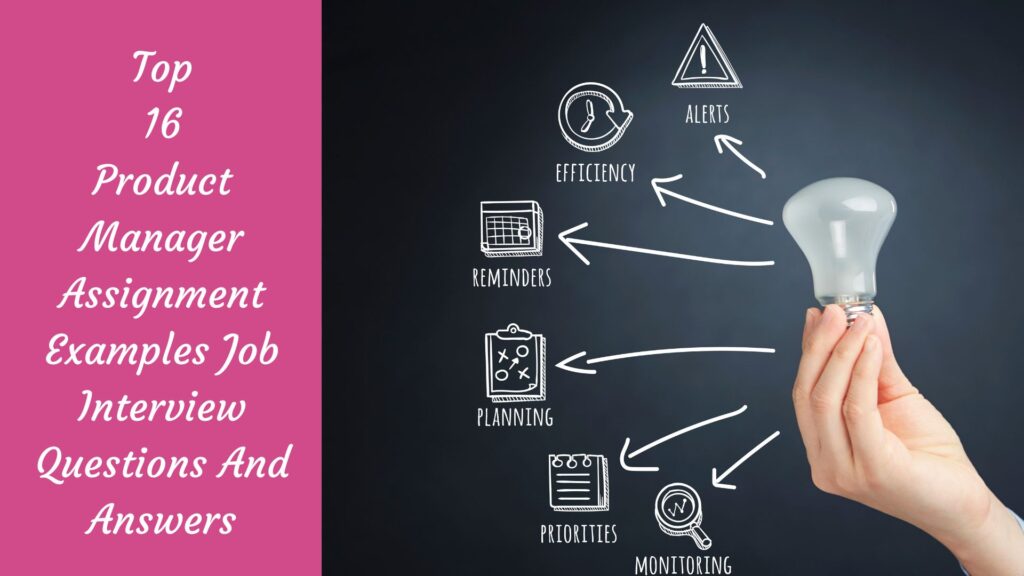Navigating a product manager interview can feel like walking through a maze, with each turn presenting a new and challenging question. It’s a high-stakes environment where the right answers can open doors, and the wrong ones can close them just as quickly.
Feeling anxious?
Don’t worry, you’re not alone. Our latest blog, “Top 16 Product Manager Assignment Examples Job Interview Questions And Answers,” is here to guide you through this labyrinth.
With expert insights and tailored advice, we’ll arm you with the knowledge you need to tackle even the toughest questions with confidence. Say goodbye to interview jitters and hello to your new career as a product manager!
Understanding the Role of a Product Manager

When you’re aiming to ace that product manager interview, comprehending the multifaceted nature of product management is like finding the golden key to unlock your next career move. A product manager wears many hats and juggles tasks that span from strategic vision planning to rolling up their sleeves and diving deep into market research.
Imagine being the captain of a ship; that’s kind of what a product manager does but in the tech and business world. They steer the product from ideation to launch, making sure it meets the users’ needs while achieving business goals.
The Multifaceted Nature of Product Management
Strategic Planning and Vision
In simplest terms, a product manager sets the vision for a product, kind of like plotting a road trip on Google Maps. They decide the destination (the product’s long-term goals) and the best route to get there, often adjusting for roadblocks or finding faster paths. For instance, if a company aims to create the next-gen educational app, the product manager might decide its key features based on competitive analysis and market needs, plotting a course for its development and launch. Competitive Analysis
Leading Cross-functional Teams
Leading cross-functional teams means you’re the conductor of an orchestra made up of engineers, designers, marketers, and more. It’s your job to ensure everyone plays in tune. Think of launching a new feature for a social media app; you’d coordinate between the UX designers, software developers, and the marketing team to ensure a harmonious launch. Cross-Functional Team Leadership
Market Research and User Understanding
Here’s where you get down to what the users really want, almost like reading minds. Using tools like surveys, A/B testing, and customer interviews, you gather insights into user needs and pain points. For example, if users find a particular app feature clunky or unnecessary, the product manager uses this feedback to streamline the app’s interface. A/B Testing
Product Lifecycle Management
Much like guiding a ship through different seas, product lifecycle management involves navigating your product through various stages from its introduction to growth, maturity, and eventually decline. It means making strategic decisions, like when to introduce new features or when to phase out outdated ones. A classic example would be how Apple manages its iPhone product line, regularly introducing new models while phasing out older versions. Product Lifecycle
Key Skills Every Product Manager Should Possess
Leadership and Communication
Essentially, you’re the team’s MVP, leading by example and communicating the vision clearly, whether it’s through presentations to stakeholders or daily check-ins with your team. The ability to articulate ideas and motivate a team is critical, much like a coach leading a sports team to victory. Leadership Communication
Analytical and Problem-Solving Skills
Being a product manager means facing a lot of “What if?” and “Why?” questions. Whether it’s analyzing user data to improve a feature or troubleshooting a sudden drop in product sign-ups, you’ll need to think on your feet, using data to guide your decisions, much like a detective solving a mystery. Problem-Solving Skills
Customer Empathy
In the world of product management, empathy is your superpower. It’s about putting yourself in the users’ shoes to really understand their experiences and needs. This could be as simple as modifying a web app’s navigation based on user feedback to enhance usability and customer satisfaction. Customer Empathy
Technical Proficiency
Lastly, you don’t have to be a coding wizard, but understanding the tech talk helps bridge the gap between the technical team and the business side. For instance, knowing the basics of web development can help you better estimate project timelines and communicate effectively with engineers. Basic Web Development
Each of these skills and roles contributes to the making of a successful product manager. It’s a rewarding career path, filled with opportunities to innovate and impact users’ lives positively. Keep these pointers in mind, and you’ll not only crack the interview but also excel in your role as a product manager.
The Top 16 Product Manager Assignment Examples and Interview Questions

Product Design and Development Questions
Q1: Describe how you would design a new product for our target market.
Answer Strategy: Discuss your process for understanding the target market, including user research and competitive analysis. Highlight how you translate these insights into product features and design.
Q2: How do you prioritize features for a new product?
Answer Strategy: Explain frameworks you use (e.g., RICE, MoSCoW) for feature prioritization, considering factors like impact, resources, and timelines. Share an example of applying these frameworks in practice.
Q3: Discuss a time when you had to make a tough product decision.
Answer Strategy: Share a specific scenario where you faced a challenging decision, such as cutting a popular feature or pivoting strategy. Emphasize how you weighed the options, consulted with stakeholders, and the outcome of your decision.
Leadership and Team Collaboration Questions
Q4: How do you lead and motivate cross-functional teams?
Answer Strategy: Describe your leadership style and methods for aligning and inspiring team members with different expertise. Include examples of tools or techniques you use for communication and collaboration.
Q5: Share an example of a conflict within your team and how you resolved it.
Answer Strategy: Provide a real-life instance where there was a disagreement or conflict in your team. Focus on your role in identifying the issue, facilitating open communication, and reaching a resolution that benefited the project.
Q6: How do you handle feedback from team members or stakeholders?
Answer Strategy: Discuss your approach to receiving and integrating feedback, including methods for filtering constructive criticism and leveraging it to improve product outcomes.
Market Analysis and User Research Questions
Q7: How do you stay updated on market trends?
Answer Strategy: Outline your strategies for keeping abreast of industry changes, customer preferences, and competitor moves. Mention specific sources, tools, or networks you rely on.
Q8: Describe a product that failed and why you think it did.
Answer Strategy: Choose a product (either one you worked on or a well-known market failure), analyze its shortcomings, and what lessons can be learned regarding market fit, execution, or other factors.
Q9: How do you validate a product idea?
Answer Strategy: Explain your validation process, including steps like market research, user interviews, prototyping, and MVP testing. Highlight how this approach helps mitigate risks and ensure market fit.
Product Launch and Go-to-Market Strategy Questions
Q10: Explain your approach to launching a product.
Answer Strategy: Detail the phases of a successful product launch, from pre-launch activities (like building hype and preparing marketing materials) to post-launch (including gathering feedback and measuring success).
Q11: How do you measure the success of a product launch?
Answer Strategy: Discuss key performance indicators (KPIs) you monitor, such as user acquisition rates, engagement metrics, and revenue impacts. Also, mention any tools or software you use for tracking these metrics.
Q12: Describe a time when a product you launched did not meet expectations and how you handled it.
Answer Strategy: Share a candid example of a less successful launch, focusing on the reasons behind it and how you responded in terms of analysis, learning from the experience, and making necessary adjustments.
Technical Proficiency and Data-Driven Decision Making
Q13: How do you use data to inform your product decisions?
Answer Strategy: Illustrate your process for collecting, analyzing, and acting on data. Include examples of decisions driven by data insights and the tools you use for data analysis.
Q14: Describe your experience with A/B testing.
Answer Strategy: Provide details on how you’ve designed and executed A/B tests, including how you selected variables, measured results, and implemented findings to optimize product performance.
Q15: How do you keep up with technological advancements relevant to your products?
Answer Strategy: Talk about your commitment to continuous learning, mentioning specific resources, courses, or communities you engage with to stay informed on tech trends.
Personal Reflection and Growth
Q16: What is one area you’re looking to improve in as a product manager?
Answer Strategy: Reflect on an aspect of product management where you see room for growth, such as a technical skill, leadership ability, or a new methodology. Discuss how you’re actively working to improve in this area.
By preparing thoughtful responses based on these strategies, you can demonstrate your depth of knowledge, strategic thinking, and readiness for the challenges of a product manager role. These examples not only highlight your qualifications but also your proactive approach to problem-solving and continuous improvement.
FAQs
1. What Makes a Product Manager Interview Different from Other Tech Interviews?
Product manager interviews are unique because they evaluate not just technical skills, but also strategic thinking, leadership qualities, and the ability to understand customer needs. Unlike other tech interviews that may focus heavily on coding or technical expertise, product manager interviews require candidates to demonstrate a blend of business acumen, technical proficiency, and user empathy.
2. How Can I Prepare for Scenario-Based Questions in a Product Manager Interview?
Scenario-based questions test your problem-solving and strategic thinking skills. To prepare, familiarize yourself with common product management frameworks like SWOT analysis, the RICE prioritization framework, and the Kano model. Practice applying these frameworks to hypothetical scenarios and reflect on past experiences where you’ve tackled similar challenges.
3. What Are the Key Metrics I Should Discuss When Asked About Measuring a Product’s Success?
Key performance indicators (KPIs) for product success often include user engagement metrics (daily active users, session length), financial metrics (revenue, cost of acquisition), and growth metrics (customer retention rate, churn rate). Tailor your response to the specific product type and industry, showing your understanding of what success looks like in that context.
4. Can You Give an Example of a Good Answer to “Describe a Product You Love and How You Would Improve It”?
A strong answer would detail a product you’re genuinely passionate about, explain what makes it stand out, and identify a specific area for improvement. For example, you could discuss a popular productivity app, praise its user-friendly design, and suggest integrating AI-driven personalization features to further enhance user experience based on individual usage patterns.
5. How Important Is Technical Expertise for a Product Manager Role, and How Can I Showcase It During an Interview?
While not all product manager roles require deep technical expertise, having a solid understanding of the technology behind your product is crucial. It enables better communication with engineering teams and informed decision-making. Showcase your technical knowledge by discussing how you’ve worked closely with engineers, contributed to technical discussions, or stayed up-to-date with technological advancements relevant to your product domain.
Conclusion
Throughout this document, we’ve uncovered the depth and variety of questions a product manager might encounter during interviews, emphasizing the importance of preparation in areas like market analysis, user research, leadership, and technical proficiency.
By adopting the suggested answer strategies, candidates can showcase their comprehensive skills and forward-thinking mindset. For those seeking to further refine their preparation and gain deeper insights into excelling as a product manager, we invite you to Learn More about our additional resources and tools designed to propel your career forward.

